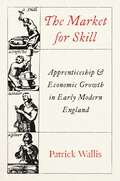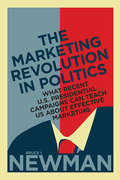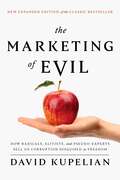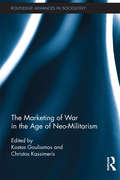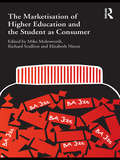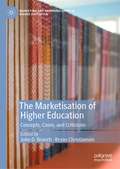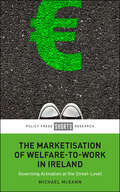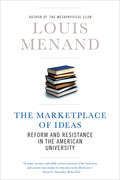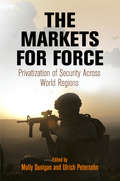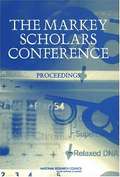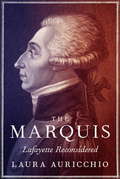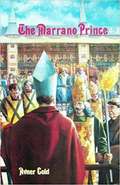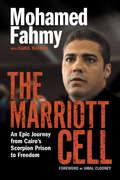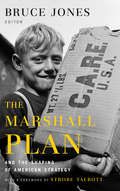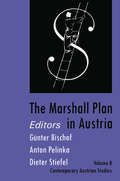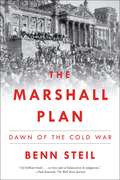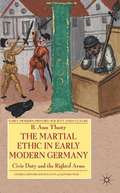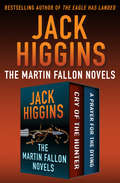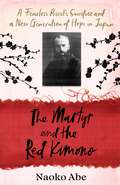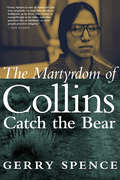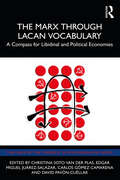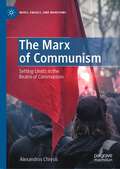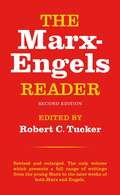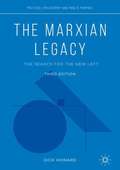- Table View
- List View
The Market for Skill: Apprenticeship and Economic Growth in Early Modern England
by Patrick WallisHow apprenticeship shaped the English economy Apprenticeship dominated training and skill formation in early modern Europe. Years spent learning from a skilled master were a nearly universal experience for young workers in crafts and trade. In England, when apprenticeship reached its peak, as many as a third of all teenage males would serve and learn as apprentices. In The Market for Skill, Patrick Wallis shows how apprenticeship helped reshape the English economy.Some historians see apprenticeship as a key ingredient in the industrial revolution; others agree with Adam Smith in seeing it as wasteful and conservative. Wallis shows that neither of these perspectives is entirely accurate. He offers a new account of apprenticeship and the market for skill in England, analyzing the records of hundreds of thousands of individual apprentices to tell the story of how apprenticeship worked and how it contributed to the transformation of England. Wallis details the activities of apprentices and masters, the strategies of ambitious parents, the interventions of guilds and the decisions of town officials. He shows how the system of early modern apprenticeship contributed to the growth of cities, the movement of workers from farms to manufacturing and the spread of new technologies and productive knowledge.In this groundbreaking study, Wallis argues that apprenticeship succeeded precisely because it was a flexible institution which allowed apprentices to change their minds and exit contracts early. Apprenticeship provided a vital channel for training that families could trust and that was accessible to most young people, whatever their background.
The Marketing Revolution in Politics
by Bruce I. NewmanIn 2008, Barack Obama's presidential campaign used an innovative combination of social media, big data, and micro-targeting to win the White House. In 2012, the campaign did it again, further honing those marketing tools and demonstrating that political marketing is on the cutting edge when it comes to effective branding, advertising, and relationship-building.The challenges facing a presidential campaign may be unique to the political arena, but the creative solutions are not. The Marketing Revolution in Politics shows how recent US presidential campaigns have adopted the latest marketing techniques and how organizations in the for-profit and non-profit sectors can benefit from their example. Distilling the marketing practices of successful political campaigns down into seven key lessons, Bruce I. Newman shows how organizations of any size can apply the same innovative, creative, and cost-effective marketing tactics as today's presidential hopefuls.A compelling study of marketing in the make-or-break world of American politics, this book should be a must-read for managers, students of marketing and political marketing, and anyone interested in learning more about how presidential campaigns operate.
The Marketing of Evil: How Radicals, Elitists, and Pseudo-Experts Sell Us Corruption Disguised As Freedom
by David KupelianMillions of Americans today embrace ideas and behaviors that would have horrified all previous generations. Why?Why have thousands of years of Judeo-Christian moral standards – the very foundation of Western Civilization – been demonized and criminalized? Why are America's families disintegrating and her schools and colleges poisoning the minds of our youth? Why is our culture becoming ever more bizarre, corrupt, degraded and deranged? Why are 3,000 innocent American children aborted daily? In this widely acclaimed exposé, veteran journalist David Kupelian reveals the brilliant marketing strategies that have turned America upside down: "Within the space of our lifetime, much of what Americans once almost universally abhorred has been packaged, perfumed, gift-wrapped, and sold to us as though it had great value. By skillfully playing on our deeply felt national values of fairness, generosity, and tolerance, these marketers have persuaded us to embrace as enlightened and noble that which every other generation has regarded as grossly self-destructive? In a word, evil." Now, in a new and expanded edition of his culture-war classic, David Kupelian continues to expose the ever-more audacious marketing campaigns and grand deceptions that threaten the very future of America. NEW EXPANDED EDITION OF THE CLASSIC BESTSELLER! "David Kupelian is one of the most thought-provoking and iconoclastic writers I know." — SEAN HANNITY "Every parent in America needs to read this book. David Kupelian skillfully exposes the secular Left's rotten-apple peddlers in devastating detail." — MICHELLE MALKIN "If you really want to understand the adversary's thinking and help turn the tide of battle, read this book!" — DAVID LIMBAUGH
The Marketing of War in the Age of Neo-Militarism (Routledge Advances in Sociology)
by Christos Kassimeris Kostas GouliamosThe post-9/11 era and the overall impact of international terrorism have generated much debate regarding the role of military apparatus in modern society. This book assesses the inherent meaning of the militarization from a critical, interdisciplinary perspective. Against the background of democracy and capitalism, The Marketing of War in the Age of Neo-Militarism challenges prevailing accounts of the "military-industrial complex" as it explores significant interrelated themes denoting the accelerating process of militarization of society. Designed to address pressing socio-political phenomena, this book is the first of its genre contesting conventional wisdom about the perceived link between war and the "military-industrial complex." It is unique not merely because of its approach, but also for its thorough analysis of deeply affected social institutions and processes such as education, popular culture, geopolitics, military expenditure, space and the environment. Contributing authors advance the discussion by exposing factual information demonstrating the nature and scope of society’s militarization. Their analysis is also broadened to encompass key concepts and diverse aspects of the subject matter that provoke a lively debate. The book offers compelling arguments that will be indispensable to scholars, students, professionals, and policy and decision makers with an interest in social and political sciences as well as in other related fields.
The Marketisation of Higher Education and the Student as Consumer
by Mike MolesworthUntil recently government policy in the UK has encouraged an expansion of Higher Education to increase participation and with an express aim of creating a more educated workforce. This expansion has led to competition between Higher Education institutions, with students increasingly positioned as consumers and institutions working to improve the extent to which they meet ‘consumer demands’. Especially given the latest government funding cuts, the most prevalent outlook in Higher Education today is one of business, forcing institutions to reassess the way they are managed and promoted to ensure maximum efficiency, sales and ‘profits’. Students view the opportunity to gain a degree as a right, and a service which they have paid for, demanding a greater choice and a return on their investment. Changes in higher education have been rapid, and there has been little critical research into the implications. This volume brings together internationally comparative academic perspectives, critical accounts and empirical research to explore fully the issues and experiences of education as a commodity, examining: the international and financial context of marketisation the new purposes of universities the implications of university branding and promotion league tables and student surveys vs. quality of education the higher education market and distance learning students as ‘active consumers’ in the co-creation of value changing student experiences, demands and focus. With contributions from many of the leading names involved in Higher Education including Ron Barnett, Frank Furedi, Lewis Elton, Roger Brown and also Laurie Taylor in his journalistic guise as an academic at the University of Poppleton, this book will be essential reading for many.
The Marketisation of Higher Education: Concepts, Cases, and Criticisms (Marketing and Communication in Higher Education)
by Bryan Christiansen John D. BranchThis edited volume explores the nature, scope, and consequences of the marketisation of higher education. Chapters identify different practices which reflect the marketisation of higher education, and offer various perspectives on the policies and procedures which stimulate and regulate it. The volume takes a holistic approach, following the notion that the marketisation of higher education both drives and is driven by the universities which form the higher education market.
The Marketisation of Welfare-To-Work in Ireland: Governing Activation at the Street-Level
by Michael McGannEPDF and EPUB available Open Access under CC-BY-NC-ND licence This book assesses how the practice of contracting-out public employment services via competitive tendering and Payment-by-Results is transforming welfare-to-work in Ireland. It offers Ireland’s introduction of a welfare-to-work market as a case study that speaks to wider international debates in social and public policy about the role of market governance in intensifying the turn towards more regulatory and conditional welfare models on the ground. It draws on unprecedented access to, and extensive survey and interview research with, frontline employment services staff, combined with in-depth interviews with policy officials, organisational managers and jobseekers participating in activation.
The Marketplace of Ideas: Reform and Resistance in the American University (Issues of Our Time)
by Louis Menand"Crisp and illuminating . . . well worth reading."--Wall Street Journal The publication of The Marketplace of Ideas has precipitated a lively debate about the future of the American university system: what makes it so hard for colleges to decide which subjects are required? Why are so many academics against the concept of interdisciplinary studies? From his position at the heart of academe, Harvard professor Louis Menand thinks he's found the answer. Despite the vast social changes and technological advancements that have revolutionized the society at large, general principles of scholarly organization, curriculum, and philosophy have remained remarkably static. Sparking a long-overdue debate about the future of American education, The Marketplace of Ideas argues that twenty-first-century professors and students are essentially trying to function in a nineteenth-century system, and that the resulting conflict threatens to overshadow the basic pursuit of knowledge and truth.
The Markets for Force
by Ulrich Petersohn Molly DuniganThe Markets for Force examines and compares the markets for private military and security contractors in twelve nations: Argentina, Guatemala, Peru, Ecuador, the United Kingdom, the Czech Republic, Ukraine, Russia, Afghanistan, China, Canada, and the United States. Editors Molly Dunigan and Ulrich Petersohn argue that the global market for force is actually a conglomeration of many types of markets that vary according to local politics and geostrategic context. Each case study investigates the particular characteristics of the region's market, how each market evolved into its current form, and what consequence the privatized market may have for state military force and the provision of public safety. The comparative standpoint sheds light on better-known markets but also those less frequently studied, such as the state-owned and -managed security companies in China, militaries working for private sector extractive industries in Ecuador and Peru, and the ways warlord forces overlap with private security companies in Afghanistan.An invaluable resource for scholars and policymakers alike, The Markets for Force offers both an empirical analysis of variations in private military and security companies across the globe and deeper theoretical knowledge of how such markets develop.Contributors: Olivia Allison, Oldrich Bures, Jennifer Catallo, Molly Dunigan, Scott Fitzsimmons, Maiah Jaskoski, Kristina Mani, Carlos Ortiz, Ulrich Petersohn, Jake Sherman, Christopher Spearin.
The Markey Scholars Conference: Proceedings
by Committee for the Evaluation of the Lucille P. Markey Programs in Biomedical SciencesThis is the second of five reports to emerge from the evaluation of the Markey Trust. As part of this assessment, the NRC hosted a scientific conference for Markey Scholars and Visiting Fellows in Rio Grande, Puerto Rico on June 28-30, 2002. The purpose of the conference was to enable the Scholars and Fellows to share their research experiences, just as they did at the annual Scholars Conferences previously conducted by the Markey Trust. All of the attending Scholars and Fellows submitted abstracts of their poster sessions. Six scholars, along with other experts in the biomedical sciences, made formal presentations. These proceedings consist of shortened versions of the individual presentations and the poster session abstracts.
The Marquis
by Laura AuricchioA major biography of the Marquis de Lafayette, French hero of the American Revolution, who, at age nineteen, volunteered to fight under George Washington; a biography that looks past the storybook hero and selfless champion of righteous causes who cast aside family and fortune to advance the transcendent aims of liberty and justice commemorated in America's towns, streets, parks, and schools named after the French nobleman. Laura Auricchio gives us a rich portrait of the man, fully revealed, a man driven by dreams of glory and felled by tragic, human weaknesses. In The Marquis, we come to understand the personal struggles, social quandaries, and idealistic visions that inspired an orphaned young man to cross an ocean and fight a war that was none of his concern; we see a guileless provincial whose unexpected inheritance allowed him to marry into the highest echelons of the French aristocracy, and become a self-consciously awkward presence at the palace of Versailles. Here is the young Lafayette, removed from the French army as a result of sweeping reforms, trapped in a gilded cage until American emissaries reached Paris seeking support for their revolution. In the American cause, Lafayette, whose only vision had been of martial glory, saw a way to reach his dreams, and seized it with gusto. Americans welcomed him with open arms, and he returned their affection fully. His American éclat was so brilliant and his enthusiasm so great that he quickly became the symbol of the Franco-American alliance that ultimately defeated Great Britain. We see how Lafayette's reputation rose to great heights during the American Revolution but collapsed during the French; that when the Bastille fell on July 14, 1789, Parisians hailed Lafayette as the French Washington and appointed him commander of their National Guard, hoping that he would be able to restore order to a city wracked by starvation and violence. As revolutionaries hurtled in radical directions and staunch monarchists dug in their heels, Lafayette lost control, remaining steadfast in his belief that the French monarchy needed to be reformed but not abolished, and doing everything in his power to prevent an American-style republic from taking root in his native land. Formerly seen as France's heroic figure, Lafayette was now viewed as opportunistic, a dreamer, and a traitor to his nation--and today remains a murky figure in French memory. In America, Lafayette's momentous departure from his homeland for the War of Independence has long been hailed as the start of an extraordinary career to be celebrated for generations. In France, it is often seen as just one of his many misbegotten undertakings. Yet no one has managed to offer a satisfactory answer to the crucial question of why: Why did Americans shower Lafayette with so much acclaim in his own time that he remains a hero today, being named an honorary U.S. citizen in 2002--becoming only the seventh person ever granted this distinction? And why, in contrast, does his memory continue to be denigrated in his own land? Auricchio, drawing on substantial new research conducted in libraries, archives, museums, and private homes in France and the United States, gives us history on a grand scale as she answers these crucial questions, revealing the man and his complex life, and challenging and exploring the complicated myths that have surrounded his name for more than two centuries.From the Hardcover edition.
The Marrano Prince (Ruach Ami #8)
by Avner GoldThe Marrano Prince, the eighth volume in the continuing Ruach Ami Series, takes place and Spain two centuries after the establishment of the Spanish Inquisition and the Expulsion of the Jews. Deprived of the talents of its Jews, Spain has gone into steep decline, and France and England have emerged as dominant powers in Europe. As the story unfolds, Spain and France are on the verge of a war in the Netherlands. A minister of the Council of State, who is also a secret Jew, is sent on a high-level diplomatic mission to the Netherlands, which turns into an unforeseen journey of discovery. When he finally returns to Spain, he finds his family has fallen under a cloud of suspicion, but before he can escape with his family he feels honor-bound to fulfill his duties to the king. In the meantime, he is being silently stalked by the evil confessor of the king and his minions in the Holy Office of the Inquisition. Before he realizes what is happening, a net of entrapment has closed around him. Danger and a sense of foreboding purveyed the pages of the gripping book. The story moves inexorably through the halls of power in Madrid, naval battles on the high seas, the marrano community of Amsterdam, the dungeons of the Inquisition in Toledo, the bullfights of Pamplona and across the length and breath of sun-drenched Spain. It is a story of courage and valor, of twists within twists peopled with colorful villains and heroes. In his inimitable fashion, Avner Gold has woven a great deal of historical information and a sense of the times into the fabric of the story itself. However, an extensive historical essay, entitled The Rise and Fall of Spain and It's Jews, has also been added to this book for the benefit of those readers who would like a better understanding of the evolution of the Jewish community of Spain and the origins and methods of the infamous Spanish Inquisition.
The Marriott Cell: An Epic Journey from Cairo's Scorpion Prison to Freedom
by Carol Shaben Amal Clooney Mohamed FahmyAward-winning journalist Mohamed Fahmy's widely anticipated account of his wrongful incarceration in Cairo's maximum-security Scorpion Prison for terrorists and political leaders, and his subsequent battle for justice, opens a remarkable window onto the closed world of Islamic fundamentalism and the bloody geopolitical struggles that dominate our headlines. An important book that reads like a political thriller, it is also a testament to the critical importance of journalism today; an inspiring love story that made front-page news; and a profoundly personal drama of one man's fight for freedom. On the night of December 29, 2013, Egyptian security forces, in a dramatic raid on the Marriott Hotel, seized Fahmy (Canadian-Egyptian Bureau Chief for Al Jazeera English) and two of his colleagues, Peter Greste and Baher Mohamed, accusing them of fabricating news as members of the outlawed Muslim Brotherhood. Their trials became a global cause célèbre condemned as a travesty. But Fahmy also never stopped being a journalist: inside Scorpion he found himself cheek by jowl with notorious Muslim Brotherhood leaders, Al Qaeda fighters, and ISIS sympathizers. Always intrepid, he took advantage of the situation to "interview" the Brotherhood about their aims, gaining exclusive insight into the geopolitical feuds between Egypt, Saudi Arabia, and the UAE on one hand and Qatar and its allies, including Turkey on the other--interviews that led him to sue his former employer, Al Jazeera, from prison. The complex power brokering of Middle Eastern and Western governments left three men trapped in a web he describes as "Global McCarthyism." But at the heart of the book is an inspiring story of two strong women: Fahmy's wife, Marwa Omara, who used every means possible to fight for his release, bravely risking her safety; and his courageous international human-rights lawyer, Amal Clooney, who championed his battle for freedom.From the Hardcover edition.
The Marrying Kind?: Debating Same-Sex Marriage within the Lesbian and Gay Movement
by Mary Bernstein and Verta TaylorAs the fight for same-sex marriage rages across the United States and lesbian and gay couples rush to marriage license counters, the goal of marriage is still fiercely questioned within the LGBT movement. Rarely has an objective so central to a social movement&’s political agenda been so controversial within the movement itself. While antigay forces work to restrict marriage to one man and one woman, lesbian and gay activists are passionately arguing about the desirability, viability, and social consequences of same-sex marriage. The Marrying Kind? is the first book to draw on empirical research to examine these debates and how they are affecting marriage equality campaigns. The essays in this volume analyze the rhetoric, strategies, and makeup of the LGBT social movement organizations pushing for same-sex marriage, and address the dire predictions of some LGBT commentators that same-sex marriage will spell the end of queer identity and community. Case studies from California, Connecticut, Massachusetts, New Jersey, Oklahoma, Vermont, and Canada illuminate the complicated politics of same-sex marriage, making clear that the current disagreements among LGBT activists over whether marriage is conforming or transformative are far too simplistic. Instead, the impact of the marriage equality movement is complex and often contradictory, neither fully assimilationist nor fully oppositional. Contributors: Ellen Ann Andersen, U of Vermont; Mary C. Burke, U of Vermont; Adam Isaiah Green, U of Toronto; Melanie Heath, McMaster U, Ontario; Kathleen E. Hull, U of Minnesota; Katrina Kimport, U of California, San Francisco; Jeffrey Kosbie; Katie Oliviero, U of Colorado, Boulder; Kristine A. Olsen; Timothy A. Ortyl; Arlene Stein, Rutgers U; Amy L. Stone, Trinity U; Nella Van Dyke, U of California, Merced.
The Marshall Plan and the Shaping of American Strategy
by Strobe Talbott Bruce D. Jones Will MorelandHow the United States helped restore a Europe battered by World War II and created the foundation for the postwar international orderSeventy years ago, in the wake of World War II, the United States did something almost unprecedented in world history: It launched and paid for an economic aid plan to restore a continent reeling from war. The European Recovery Plan-better known as the Marshall Plan, after chief advocate Secretary of State George C. Marshall-was in part an act of charity but primarily an act of self-interest, intended to prevent postwar Western Europe from succumbing to communism. By speeding the recovery of Europe and establishing the basis for NATO and diplomatic alliances that endure to this day, it became one of the most successful U.S. government programs ever.The Brookings Institution played an important role in the adoption of the Marshall Plan. At the request of Arthur Vandenberg, chairman of the Senate Foreign Relations Committee, Brookings scholars analyzed the plan, including the specifics of how it could be implemented. Their report gave Vandenberg the information he needed to shepherd the plan through a Republican-dominated Congress in a presidential election year.In his foreword to this book, Brookings president Strobe Talbott reviews the global context in which the Truman administration pushed the Marshall Plan through Congress, as well as Brookings' role in that process. The book includes Marshall's landmark speech at Harvard University in June 1947 laying out the rationale for the European aid program, the full text of the report from Brookings analyzing the plan, and the lecture Marshall gave upon receiving the Nobel Peace Prize in 1953. The book concludes with an essay by Bruce Jones and Will Moreland that demonstrates how the Marshall Plan helped shape the entire postwar era and how today's leaders can learn from the plan's challenges and successes.
The Marshall Plan in Austria: Vol 8 (Contemporary Austrian Studies #Vol. 8)
by Günter Bischof, Anton Pelinka and Dieter StiefelPerhaps no country benefitted more from the Marshall Plan for assistance in reconstruction of Europe after World War II than Austria. On a per capita basis, each American taxpayer invested $80 per person in the Plan; each Austrian received $133 from the European recovery program, more than any other of the sixteen participating countries. Without the Marshall Plan, the Austrian economic miracle of the 1950s would have been unthinkable. Despite this, contemporary Austria seems to have forgotten this essential American contribution to its postwar reconstruction. This volume in the Contemporary Austrian Studies series examines how the plan affected Austria, and how it is perceived today.The political context of the Marshall Plan in Austria is addressed in essays by Jill Lewis and Matthew Berg. Dieter Stiefer describes the vast Soviet economic exploitation of their Austrian occupation zone. Andrea Komlosy shows how the Marshall Plan helped complete the division of Europe. Siegfried Beer suggests the secret involvement of the CIA in the Marshall Plan, while Hans J³rgen Schr÷der analyzes the effectiveness of Marshall Plan propaganda programs in Germany and Austria.The macroeconomic impact of Marshall Plan funds on Austrian economic policy is outlined by Hans Seidel. Kurt Tweraser, Georg Rigele and G³nter Bischof suggest the microeconomic importance of funds for the steel, electricity and tourist sectors of the Austrian economy. Wilhelm Kohler's sweeping analysis compares the American transfer of funds to postwar Europe with current debates about the cost of European Union enlargement. The legacy of the Marshall Plan is addressed by former Austrian Finance Minister Ferdinand Lacina. Kurt Loffler and Hans Fubenegger summarize the activities of the Economic Recovery Program Fund. Coming on the heels of the fiftieth anniversary of the Marshall Plan, this compelling overview of the Plan and its impact will be important for historians, those interested in international politics, and Austrian scholars.G³nter Bischof is professor of history and associate director of Center-Austria at the University of New Orleans; Anton Pelinka is professor of political science at the University of Innsbruck and director of the Institute of Conflict Research in Vienna; Dieter Stiefel is professor of social and economic history at the University of Vienna and executive secretary of the Schumpeter Society in Vienna.This volume offers a collection of articles, mostly by contemporary Austrian-born historians, touching on various phases of the Marshall Plan administered through the European Recovery Program (ERP) and its successors counterfunds' assistance to the present. A splendid introduction followed by the key thirteen articles on the plan is augmented by several nontopical essays and book reviews, along with a survey of Austrian politics in 1998. A number of articles emanated from a 1998 conference at the University of New Orleans. Both novice and specialist will appreciate this book."-The Historian
The Marshall Plan: Dawn of the Cold War
by Benn SteilWinner of the 2019 New-York Historical Society Barbara and David Zalaznick Book Prize in American History Winner of the 2018 American Academy of Diplomacy Douglas Dillon Award Shortlisted for the 2018 Duff Cooper Prize in Literary Nonfiction Honorable Mention (runner-up) for the 2019 ASEEES Marshall D. Shulman Prize &“[A] brilliant book…by far the best study yet&” (Paul Kennedy, The Wall Street Journal) of the gripping history behind the Marshall Plan and its long-lasting influence on our world.In the wake of World War II, with Britain&’s empire collapsing and Stalin&’s on the rise, US officials under new Secretary of State George C. Marshall set out to reconstruct western Europe as a bulwark against communist authoritarianism. Their massive, costly, and ambitious undertaking would confront Europeans and Americans alike with a vision at odds with their history and self-conceptions. In the process, they would drive the creation of NATO, the European Union, and a Western identity that continue to shape world events. Benn Steil&’s &“thoroughly researched and well-written account&” (USA TODAY) tells the story behind the birth of the Cold War, told with verve, insight, and resonance for today. Focusing on the critical years 1947 to 1949, Benn Steil&’s gripping narrative takes us through the seminal episodes marking the collapse of postwar US-Soviet relations—the Prague coup, the Berlin blockade, and the division of Germany. In each case, Stalin&’s determination to crush the Marshall Plan and undermine American power in Europe is vividly portrayed. Bringing to bear fascinating new material from American, Russian, German, and other European archives, Steil&’s account will forever change how we see the Marshall Plan. &“Trenchant and timely…an ambitious, deeply researched narrative that…provides a fresh perspective on the coming Cold War&” (The New York Times Book Review), The Marshall Plan is a polished and masterly work of historical narrative. An instant classic of Cold War literature, it &“is a gripping, complex, and critically important story that is told with clarity and precision&” (The Christian Science Monitor).
The Martial Ethic in Early Modern Germany
by B. Ann TlustyFor German townsmen, life during the sixteenth and seventeenth centuries was characterized by a culture of arms, with urban citizenry representing the armed power of the state. This book investigates how men were socialized to the martial ethic from all sides, and how masculine identity was confirmed with blades and guns.
The Martin Fallon Novels: Cry of the Hunter and A Prayer for the Dying (The Martin Fallon Novels)
by Jack HigginsFrom the New York Times–bestselling author of The Eagle Has Landed: An IRA hit man tries to walk the razor&’s edge when he finds himself the odd man out. In these edge-of-your-seat international thrillers, Jack Higgins introduces his profoundly conflicted and deeply flawed IRA hero, Martin Fallon, trapped in a life of violence and fighting for redemption. Cry of the Hunter: After joining the IRA, Martin Fallon shot up the ranks in the fight against the Brits in Northern Ireland with his tactical brilliance and fierce commitment. Then, after a daring escape from prison, he simply disappeared. After years of hiding from the world in his books and the bottle, he thinks he&’s out. He&’s wrong. The IRA wants him to break a high-ranking Ulster rebel out of prison. Fallon reluctantly agrees, but soon finds that in his absence, the IRA has changed. Those who wanted freedom have been replaced by bloodthirsty psychopaths who only crave power. Now, to save the country he loves, Fallon must turn on his own people. A Prayer for the Dying: There was a time when Martin Fallon had no problem killing for his IRA brethren, without remorse or regret. But when a mistake leads to the explosion of a school bus full of children, Fallon flees to London to hide with his guilt. His seclusion is broken when he agrees to make one last killing on behalf of the criminal Meehan brothers. But when the hit is witnessed by a priest, the Meehans want the clergyman dead too. In a desperate struggle for his soul, Fallon must protect the priest by fighting the ruthless Meehans as well as his former IRA comrades, who have decided that Fallon himself needs to be silenced. Made into a film starring Mickey Rourke as Fallon, A Prayer for the Dying is a &“tough . . . superbly written&” thriller (The New York Times Book Review).
The Martyr and the Red Kimono: A Fearless Priest’s Sacrifice and A New Generation of Hope in Japan
by Naoko AbeThe remarkable true story of Saint Maximilian Kolbe, and the two men in war-torn Japan whose lives he changed forever.On the 14th of August 1941, a Polish priest named Maximilian Maria Kolbe was murdered in Auschwitz.Kolbe's life had been remarkable. Fiercely intelligent and driven, he founded a movement of Catholicism and spent several years in Nagasaki, ministering to the 'hidden Christians' who had emerged after centuries of oppression. A Polish nationalist as well as a priest, he gave sanctuary to fleeing refugees and ran Poland's largest publishing operation, drawing the wrath of the Nazis. His death was no less remarkable: he volunteered to die, saving the life of a fellow prisoner.It was an act that profoundly transformed the lives of two Japanese men. Tomei Ozaki was just seventeen when the US dropped an atomic bomb on Nagasaki, destroying his home and his family. Masatoshi Asari worked on a farm in Hokkaido during the war and was haunted by the inhumane treatment of prisoners in a nearby camp. Forged in the crucible of an unforgiving war, both men drew inspiration from Kolbe's sacrifice, dedicating their lives to humanity and justice. Ozaki followed in his footsteps and became a friar. Asari created cherry trees as peace offerings.In The Martyr and the Red Kimono, award-winning author Naoko Abe weaves together a deeply moving and inspirational true story of resistance, sacrifice, guilt and atonement.
The Martyrdom of Collins Catch the Bear
by Gerry SpenceThe search for justice for a Lakota Sioux man wrongfully charged with murder, told here for the first time by his trial lawyer, Gerry Spence. This is the untold story of Collins Catch the Bear, a Lakota Sioux, who was wrongfully charged with the murder of a white man in 1982 at Russell Means&’s Yellow Thunder Camp, an AIM encampment in the Black Hills in South Dakota. Though Collins was innocent, he took the fall for the actual killer, a man placed in the camp with the intention of compromising the reputation of AIM. This story reveals the struggle of the American Indian people in their attempt to survive in a white world, on land that was stolen from them. We live with Collins and see the beauty that was his, but that was lost over the course of his short lifetime. Today justice still struggles to be heard, not only in this case but many like it in the American Indian nations.
The Marx Through Lacan Vocabulary: A Compass for Libidinal and Political Economies
by Christina Soto van der Plas, Edgar Miguel Juárez-Salazar, Carlos Gómez Camarena and David Pavón-CuéllarThis text explores a set of key concepts in Marxist theory as developed and read by Lacan, demonstrating links and connections between Marxist thought and Lacanian practice. The book examines the complexity of these encounters through the structure of a comprehensive vocabulary which covers diverse areas, from capitalism and communism to history, ideology, politics, work, and family. Offering new perspectives on these concepts in psychoanalysis, as well as in the fields of political and critical theory, the book brings together contributions from a range of international experts to demonstrate the dynamic relationship between Marx and Lacan, as well as illuminating "untranslatable points" which may offer productive tension between the two. The entries trace the trajectory of Lacan’s appropriation of Marx’s concepts and analyses how they were questioned, criticized, and reworked by Lacan, accounting for the wide reach of two thinkers and worlds in constant homology. Each entry also discusses psychoanalytic debates relating to the concept and seeks to refine the clinical scope of Marx’s work, demonstrating its impact on the social and individual dimensions of Lacanian clinical practice. With a practical and structured approach, The Marx through Lacan Vocabulary will appeal to psychoanalysts and researchers in a range of fields, including political science, cultural studies, and philosophy.
The Marx of Communism: Setting Limits in the Realm of Communism (Marx, Engels, and Marxisms)
by Alexandros ChrysisFollowing Marx’s own itinerary from Paris to London, from politics to the critique of political economy, The Marx of Communism delves into a creatively unfolding international debate on the democracy-communism relation, while supporting a 21st century communism as a social alternative to capitalism. Taking into consideration Marx’s analysis of communism both as a movement and a social formation, this study focuses on the dialectics of transition from capitalism to communism. Dealing with communism as the outcome of a long-term cultural and political process, the author defends Marxian communism as the open-ended constitution of a self-governed demos, whose citizens create their own way of life on the ground of a stateless and classless society. From this point of view, the end of the state does not mean the end, but the revival of politics in terms of a communist bios. Reshaping their collective and personal values and setting limits to the production/technology dynamics of their economy, this book argues, the citizens of a communist polis form a promising antithesis to the private individuals of a capitalist society.
The Marx-Engels Reader, Second Edition
by Robert C. TuckerCompiles the significant writings of Marx and Engels in an attempt to trace the origins and meaning of classical Marxism.
The Marxian Legacy: The Search for the New Left (Political Philosophy and Public Purpose)
by Dick HowardThe Marxian Legacy, first published in 1977 and released in a second edition in 1988, was and remains distinct in its view of Marxian theory as 'critique, ' aware of its own origins and limitations and self-conscious about its own historical rootedness in changing social and political conditions. This new and fully revised third edition retains the original synthesis of the divergent traditions of German, critical, and French Marxisms into a living Marxian legacy that changes and reconceptualizes itself, while also providing a new critical introduction and concluding chapter. Such a re-evaluation of the Marxian legacy, which was urgent in the 1970s when the United States was caught up in imperial wars and domestic as well as racial conflict, remains relevant today when—as was the case nearly half a century ago—Marx’s legacy has largely been forgotten and yet remains as a symbol of radical thinking that could inspire the new movements. The Marxian Legacy, 3rd Edition retains the freshness of discovery from those times while fully updating the text for our contemporary moment, and adding two features: a philosophical closure; and, a perspective on what was possible then, and what remains to be done today.
